OAI Summer Programs Empower Future Engineers
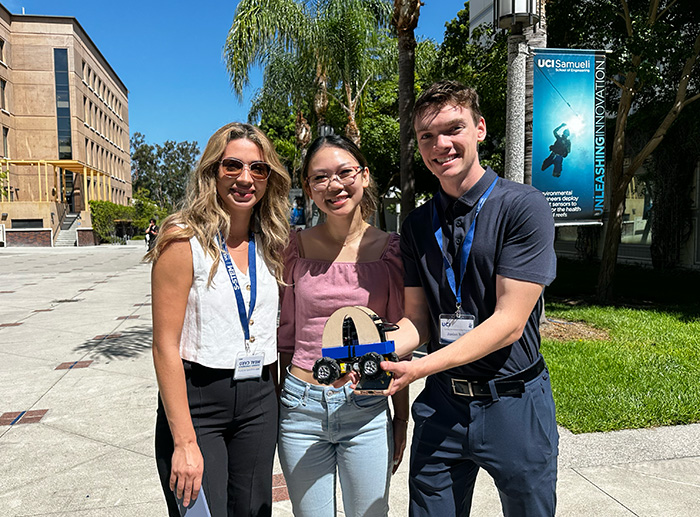
Nov. 8, 2023 - During the summer and fall, the Stacey Nicholas Office of Outreach, Access & Inclusion (OAI) in the Samueli School of Engineering offers numerous outreach and inreach programs and opportunities to an increasing number of prospective and incoming students, many of whom are underrepresented in STEM fields. This year proved no exception in generating interest in STEM and exposing more than 200 participants to hands-on engineering activities.
“Early exposure is key in creating a diverse STEM workforce. Our goal is to empower young students who might not consider engineering as an obtainable degree,” said Analia Rao, the office of OAI’s executive director.
FABcamp
During the summer, OAI holds engineering programs to inspire youth to consider STEM fields, particularly in engineering. The highly popular FABcamp offers middle school students a two-week opportunity to learn about engineering disciplines as well as various fabrication and prototyping technologies. This summer, the participants created their own photo booths.
“It’s really exciting to see what they’re capable of doing,” says UCI mechanical engineering student Daniella Campuzano. “They’re using a Raspberry Pi at age 12.” For the uninitiated, the pi she refers to isn’t sweet or tart but rather a low-cost credit-card-sized computer that plugs into a monitor. It was the perfect tool to train sixth to eighth grade students in computer programming skills.
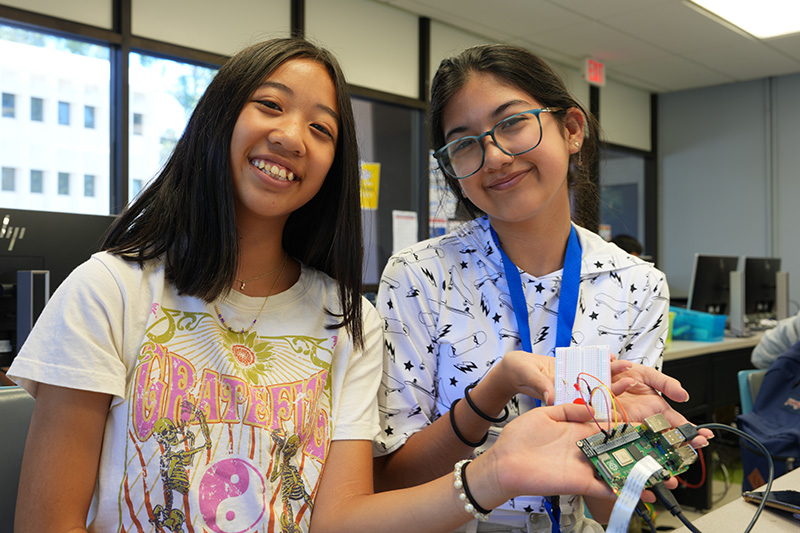
“We’re wiring a Raspberry Pi to the computer to take photos, connecting it to the breadboard,” says 13-year-old Ari Martino. Martino and her teammate Tiffany Le wired and coded their way to creating their own photo booth.
Another FABcamp project had the youth create apps to promote one of the United Nation’s 17 sustainability goals such as eradicating poverty and protecting marine life. One student designed a video game to bring water to a remote village, while 13-year-old Eduardo Martinez proudly shared, “I’m making a video game on removing trash from the ocean.”
Led by Leyla Riley, OAI’s director of outreach, FABcamp is in its 11th year and is funded by the Broadcom Foundation, which gives scholarships to students from under-resourced communities in Santa Ana. During those two weeks in July, 24 students got to interact with UCI engineering faculty as well as graduate and undergraduate students. “The class has really good energy,” says Le, “I like our counselors. We respect them, but they’re more like older siblings.”

M-SPIRE
OAI in partnership with UCI’s Center for Complex and Active Materials (CCAM), a National Science Foundation’s Materials Research Science and Engineering Center (MRSEC), hosted the Materials Summer Program to Inspire, Recruit, and Enrich (M-SPIRE).
M-SPIRE is an annual 2-week summer program for high school and community college students that focuses on materials science and engineering. CCAM faculty members lead the team- and project-based activities and mentored students. The program also seeks to inspire and prepare students to pursue bachelor’s degrees in materials-related fields. Students learned about the college admission and transfer processes and engaged with UCI faculty, undergraduate and graduate students to learn about their research and educational journeys.
This July, the two-week M-SPIRE program taught 18 high school and junior college students how to design boats and bridges via the 3D modeling program SolidWorks. Abigail Tolentino, who wants to major in chemical engineering, said “I love how we got to learn real-life applications.” The students not only saw their designs come to life via 3D printing, their bridges also went under stress tests while the boats competed in a microrobot boat race.
UCI engineers and scientists also hosted lab tours and shared how new materials are being used for energy, health care, aerospace and sustainability.
M-SPIRE was led by CCAM Education Director Professor Regina Ragan, Co-Director Professor Joe Patterson, and OAI Executive Director Analia Rao.
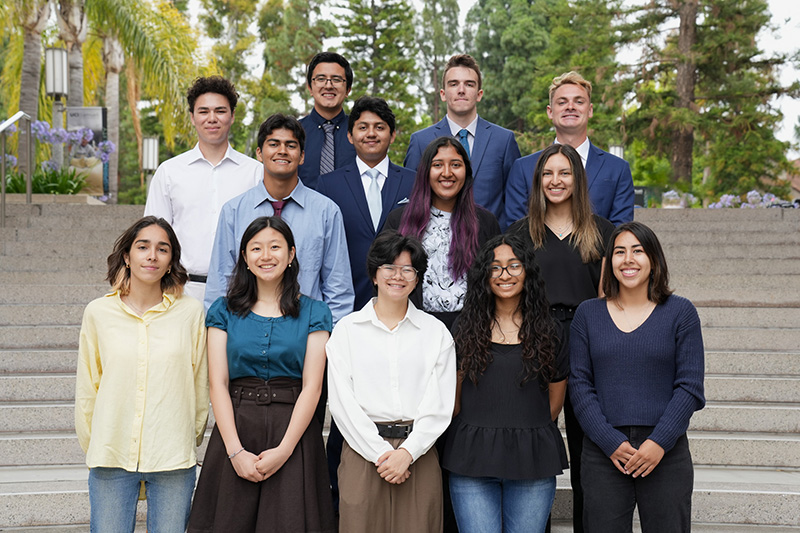
Materials Research Experiences for Undergraduates (REU)
Once again, OAI partnered with UCI’s MRSEC CCAM to host 13 undergraduate students from various universities across the country, for an eight-week summer research experience with a focus on the design, synthesis, and characterization of new materials.
During this program, the students conducted research under the guidance of a REU faculty advisor and junior research fellows mentor. In addition, students participated in various materials bootcamps and seminars led by CCAM faculty. Also, in collaboration with the Summer Undergraduate Research Fellowship (SURF) program, hosted within UCI's Graduate Division, students engaged in a wide range of academic and professional development activities aimed at enhancing their readiness for graduate education. Students presented their work during the research symposium in mid-August.
Summer Enrichment Field Trips
The summer also saw a variety of groups visit to learn about educational opportunities at UCI’s Samueli School of Engineering. mechanical and aerospace engineering Professor Jack Brouwer and his team at the National Fuel Cell Research Center partnered with OAI’s executive director to welcome 13 high school students from the Achievement Institute of STEM Scholars (AISS).
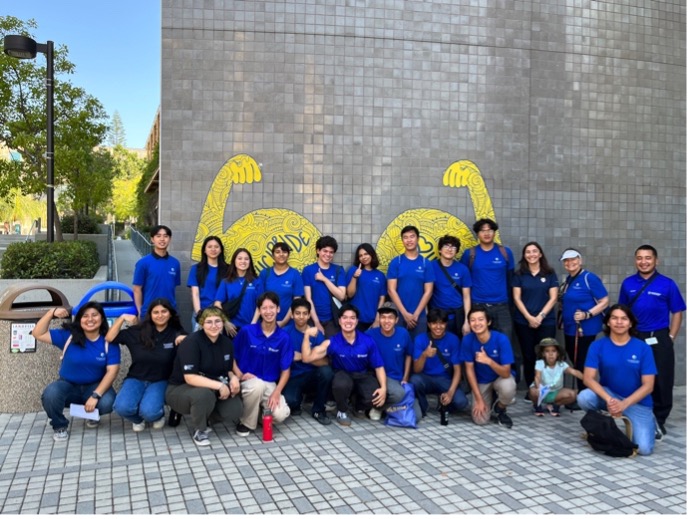
AISS is a non-profit organization that empowers low-income students in Orange County to gain access to educational opportunities at colleges and universities in STEM fields. This visit was sponsored by OAI, and additional funding was provided by Southern California Gas and the National Renewable Energy Laboratory. During the visit, students had a full day of educational experiences, beginning with a presentation on sustainability and hydrogen's importance. They toured the APEP facilities, enjoyed lunch at Brandywine, conducted experiments involving electric motors and electrolysis, participated in a student panel with current UCI students, and enjoyed a campus tour.
This summer, OAI also hosted a visit of 40 community college students from the NASA Community College Aerospace Scholars Program. For this visit, the office partnered with materials science and engineering Professor Lorenzo Valdevit and Ben Dolan, the technical director of UCI’s Institute for Design and Manufacturing Innovation. Students had the chance to learn about Professor Valdevit’s research and engaged in conversations with current UCI graduate students. They also enjoyed touring the Institute for Design & Manufacturing Innovation (IDMI) and Advanced Casting Research Center (ACRC). The day culminated with a campus tour.
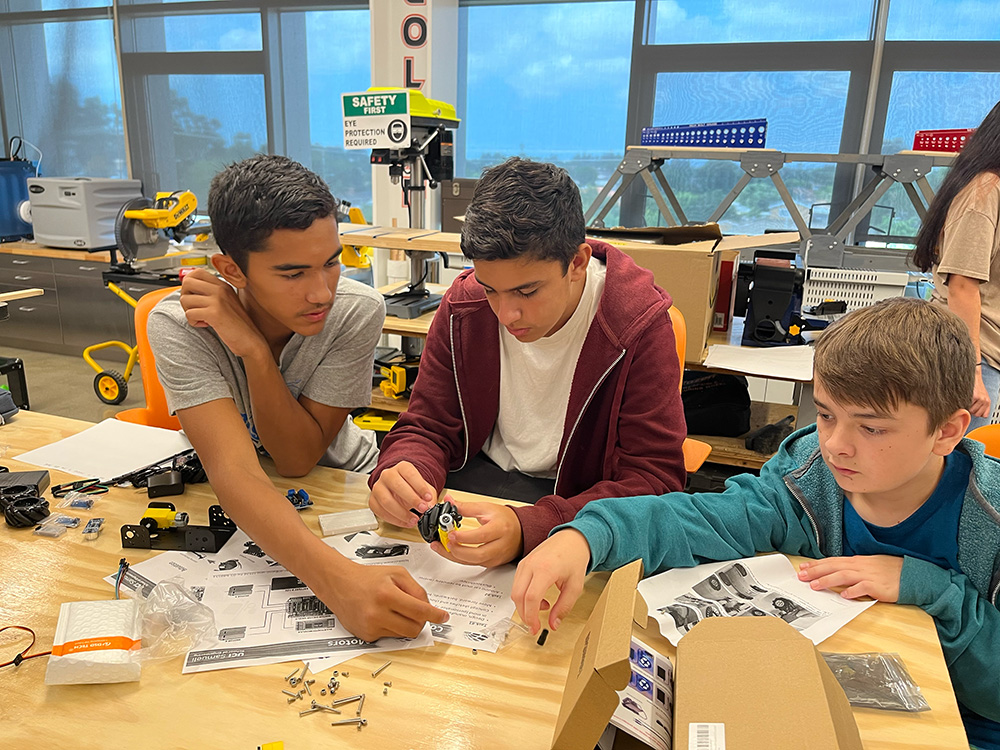
In September, OAI partnered with the Samueli Academy, a public charter school in Santa Ana, for their Engineering Ignition Day. Two dozen middle and high school students worked in teams to build a robot that was programmed with Arduino software. “It was inspiring and impressive to see their high engagement and how much they accomplished in such a short time,” said Rao. “All teams had a running robot by the end and seeing them celebrate that accomplishment was the highlight of the day!” The activity was led by mechanical and aerospace engineering Professor David Copp and UCI engineering undergraduate students.
Inreach Summer Programs
OAI and the S-STEM Program Leadership Team hosted the S-STEM Summer Bridge Program for the largest incoming engineering cohort of S-STEM scholars - 41 transfer students from 25 different community colleges across California.
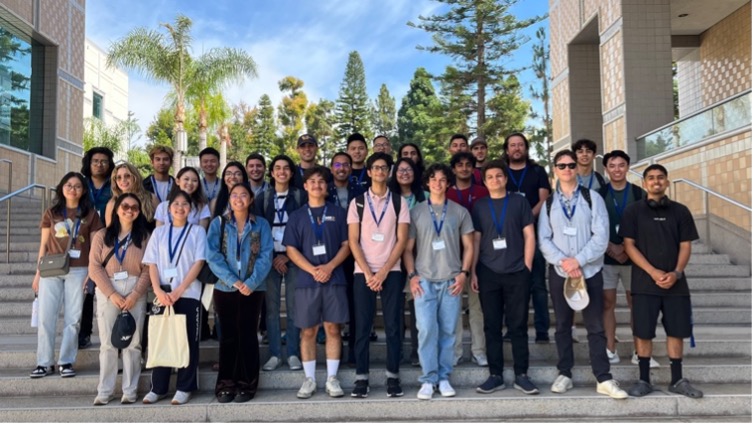
Funded by the National Science Foundation (NSF), the UC Irvine Pathways to Engineering Collaborative (S-STEM) implements a scholarship program to help low-income students from diverse backgrounds to successfully transfer to and persist in the engineering program of a four-year university. In addition to the financial support, students in this program join a cohort of peers and participate in co-curricular and community building activities throughout the year to further enhance their educational experience and preparation for engineering careers.
The one-week residential program is designed to help ease the students’ transition to UCI.
The OAI Summer Transition Program which is funded by the Nicholas Endowment, is held just before the school year begins. It includes incoming freshman and transfer students and saw 29 participants this year. The program is designed to give students a glimpse into life at UCI and connect them with a community that will support them throughout their educational journey.
Finally, incoming graduate students benefited from the one-week Rising Doctoral Institute for incoming doctoral candidates from underrepresented groups in engineering. Led by Rao and biomedical engineering Professor Michelle Digman who also serves as the Stacey Nicholas Endowed Chair for Diversity in Engineering Education, the two-day, in-person program funded by NSF is designed to help students transition into their doctorate and succeed in their studies.
The program offers a variety of workshops on topics related to graduate school success, and most importantly, provides students with a community that will support them throughout their time at UCI. The 11 participants met current graduate students, faculty and staff from various departments and learned about resources available in the school and across campus. The RDI program is followed by monthly success groups, where these students continue to meet with cohort peers, benefiting from continued professional development and networking opportunities.
Established in 2014, the Stacey Nicholas Office of Outreach, Access and Inclusion in the Samueli School of Engineering supports the recruitment, retention and graduation of students from historically excluded populations who are currently underrepresented in engineering.
- Natalie Tso
